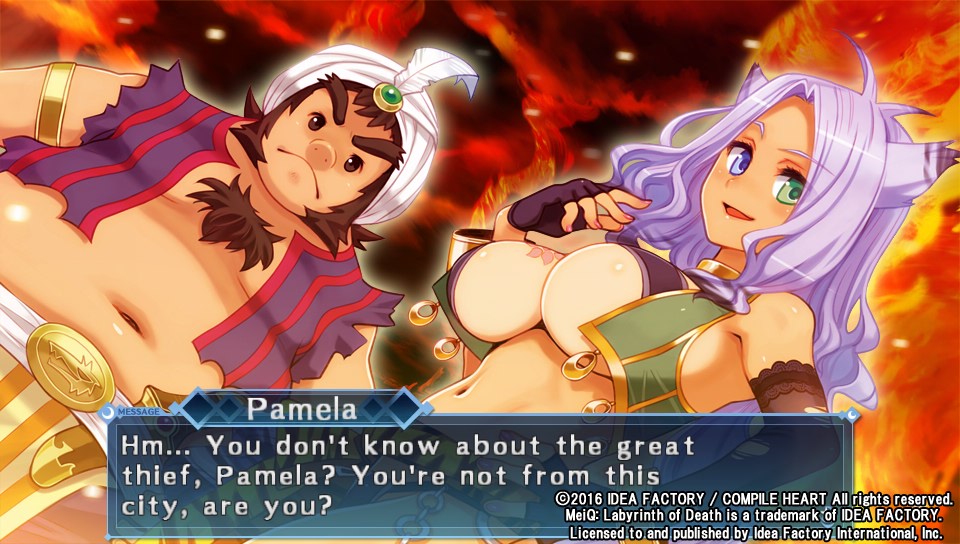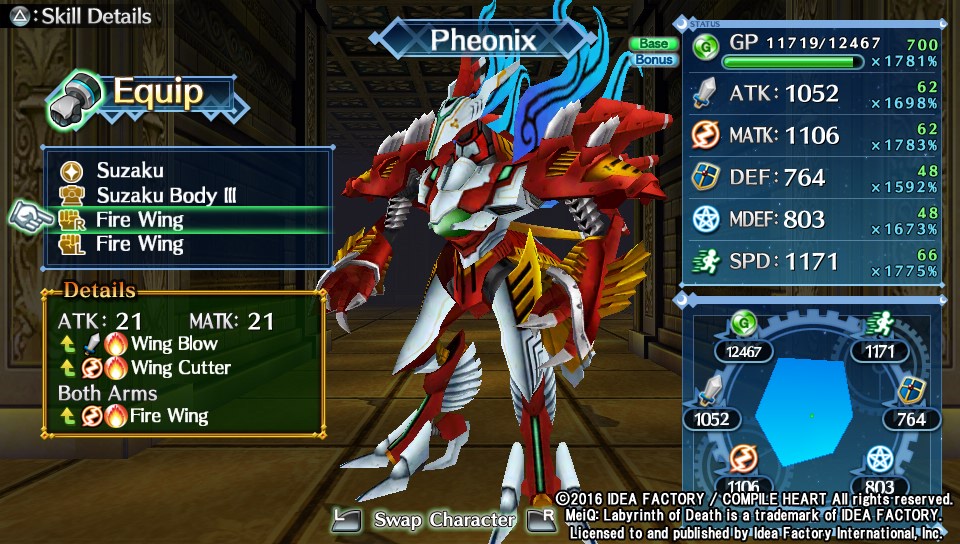Another localized, turn-based RPG comes our way from Japan for the PlayStation Vita titled MeiQ: Labyrinth of Death featuring females with big “hearts” trying to save the world from an eternal night. These five Machina Mages must work together in order to fulfill a prophecy of awaking the world by turning its key after being blessed from each Tower’s springs. The title is colorful and begs the player to give it a try, which any turn-based, dungeon-crawling enthusiast would love, but is this title for everyone?
Risque & Well-Drawn Character Designs: What stands out immediately in this title is the amount of scantily-clad women there are. The designs for the five main Machina Mages, antagonists, and Guardians are interesting and seems to suit their personalities as some range from safe to very risque to just plain cool-looking. The Guardians, Mages’ machines that fight alongside them, have sharp designs that make themselves stand out from one another. Many of the bosses encountered throughout the Towers appear intimidating and, many times, are since they’re challenging unless the player uses a “Monster-Calling” item to grind their level up. It’s good to know that Compile Heart is able to make me second guess approaching my enemies with their artwork.
Lots of customization: The customizing factor that comes into MeiQ applies only to the Guardians that the player makes contracts with during their quest. You are able to either purchase, create, or find these interchangeable body parts from the shop, smith or dungeons, respectively. There’s a lot of thought and strategy that’s put into creating your own Guardians that are compatible with their specific Machina Mages’ preferred element, as they are all different. Compile Heart designed this system with the players’ preferred strategies in mind as you can change body parts for the Guardians to be stronger, more effective against certain types, and perform combos with one another.
Skipping, skipping, skipping: This isn’t just an option with dialogue between characters if you want to speed the action up, but also during battles. Player will not have to watch all the animated sequences that go into every attack as they can “Repeat” the same moves from before and can speed the sequence up when they’re grinding to level up their characters. This is a fantastic addition for a turn-based game that should be included in others when leveling up is necessary as it removes the headache and time consumption significantly.
Eng/Jap Voice Acting: This came as a surprise due to the fact that most localized JRPGs, especially for Vita, that come from the East never usually have English as an audio option next to Japanese and the subtitles. Idea Factory does this for many titles they localize to the West and it’s refreshing as the player is given the option to switch back and forth if they want. The English voice actors do their Japanese counterparts justice, trying to capture the same sounds and emotions they convey as best they can.
Plot lacks later on: While the entire concept of the story seems to be interesting at first, it begins to lack later on when it starts to follow a basic rule book for storytelling when it comes to JRPG titles in which heroes must form together to realize that they all must help one another. The dialogue suffers when all the girls begin to buddy up with the power of friendship, which could have easily been remedied if Flare (the obvious rebellious one) was more antagonistic and could have possibly become evil to make it more compelling. Venturing back and forth between these colorful towers also begins to become repetitive due to the fact that it follows a similar pattern and layout.
Machina Mages are invisible during battle: The Mages are able to reinforce the Guardians with spells, attack physically or magically, or even heal/repair allies. Unfortunately, no animated version of them appear and only their drawn avatar is seen during the battle if they’re selected to perform a command. This was disappointing as you’d want to see them actually performing the actions instead of an sword slashing the beasts out of nowhere.
Poor backdrop: The dungeons you search through are each unique and based on the element they’re colored after but lack in terms of both appeal and graphics. The movement aspect allows the player to travel around freely searching for treasures and encountering creatures in first-person format, but it doesn’t really offer much in the way of entertainment and can, quite often, get tedious. There is no telling how large a floor can be when first entered and often players will find dead ends that simply become frustrating. The areas look awfully designed and appear as if from a PlayStation 1 JRPG, often causing the player to look at the map only while roaming.
Not a lot of replay value: As the story suffers from the repetitive nature of going through each tower, there’s nothing much in the way of beginning the game all over again in order to try out a different set of characters. Very little will be different except the fact that the player will have become accustomed to the layout of the dungeons and how to manipulate their stats better for their Mages/Guardians. There is a more difficult setting but it’s highly recommended for veteran turn-based strategy players to take the Hardest mode right off the bat as the gameplay will feel bland and boring when you get the mechanics after the first few battles.
At the end of the day, MeiQ: Labyrinth of Death is a decent game that can hold your interest if you’re a beginner new to turn-based strategy games; Veteran players may decide to turn their head for this one but I would suggest giving it a shot as the customization factor and fast forward feature actually make the journey more enjoyable. The plot doesn’t really challenge the player’s imagination but still offers a good backdrop during dialogue when the measly dungeons don’t invigorate the player’s senses.
- Graphics - 50%50%
- Gameplay - 70%70%
- Controls - 80%80%
- Sound - 70%70%
- Replay Value - 40%40%
Summary
Consider Picking Up
MeiQ: Labyrinth of Death was developed by Compile Heart and published by Idea Factory International. It was released for PlayStation Vita on September 13th, 2016 in North America and September 16th in Europe. A press review copy was provided for The Hidden Levels. Many studios submit copies for site review but this is in no way factored into our review scores. Games are scored on their individual merits and our rating system is explained here.
![]()


Comments are closed